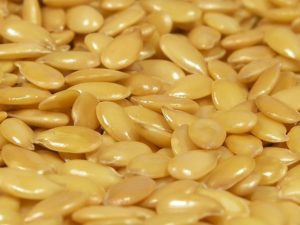Flax Facts – Reap the Health Benefits of This Little Seed

Flaxseed, the humble little brown seed with a nutty flavor, is a powerhouse in the nutrition world. It’s able to reduce blood pressure, decrease risk of heart attacks and stroke, improve skin quality, help control blood sugar levels, reduce cholesterol, and even prevent breast and colon cancer–all in a single seed!
But what makes flax so powerful? Flaxseed contains high concentrations of alpha linoleic acid, a form of omega-3 fatty acids, which serve as the basic building blocks of cell walls. Additionally, flax is high in lignans, powerful antioxidants known for alleviating menopausal symptoms and fighting breast cancer. There are three forms of flaxseed, making it easy to incorporate into your diet.
Flax Oil
While available in capsule form to be taken as a supplement, flax oil is best consumed as a food to get the most benefits from it. Many nutritionists often recommend purchasing the oil in small quantities, storing it in the refrigerator, and consuming a daily intake of two tablespoons. You can add a tablespoon to your morning smoothie or substitute flax oil in the vinaigrette dressing for your salad.
Flax oil breaks down to trans fats when heated, so it should never be used in cooking. While lower in lignans than other forms of flax, the oil is sometimes processed to preserve the lignans. Check the label for details.
Flaxseeds
Whole seeds are sure to have all the nutritional benefits of flax. Simply add these to your granola or salads for a nutty flavor. If a little tough on the teeth, grind them in a coffee grinder and sprinkle on foods. One note: raw, whole flaxseeds contain chemicals that can affect thyroid function. To get around this, simply toast the seeds in the oven for twenty minutes at 250 degrees, or limit your consumption of raw seeds to three to four tablespoons a day.
Flax Meal
Ground flax meal is another option to get the powerful nutritional value of flax. Add a tablespoon of it to your smoothies for extra fiber, or stir it into your oatmeal in the morning.
Source: ABMP
- Blue Flax Flowers







